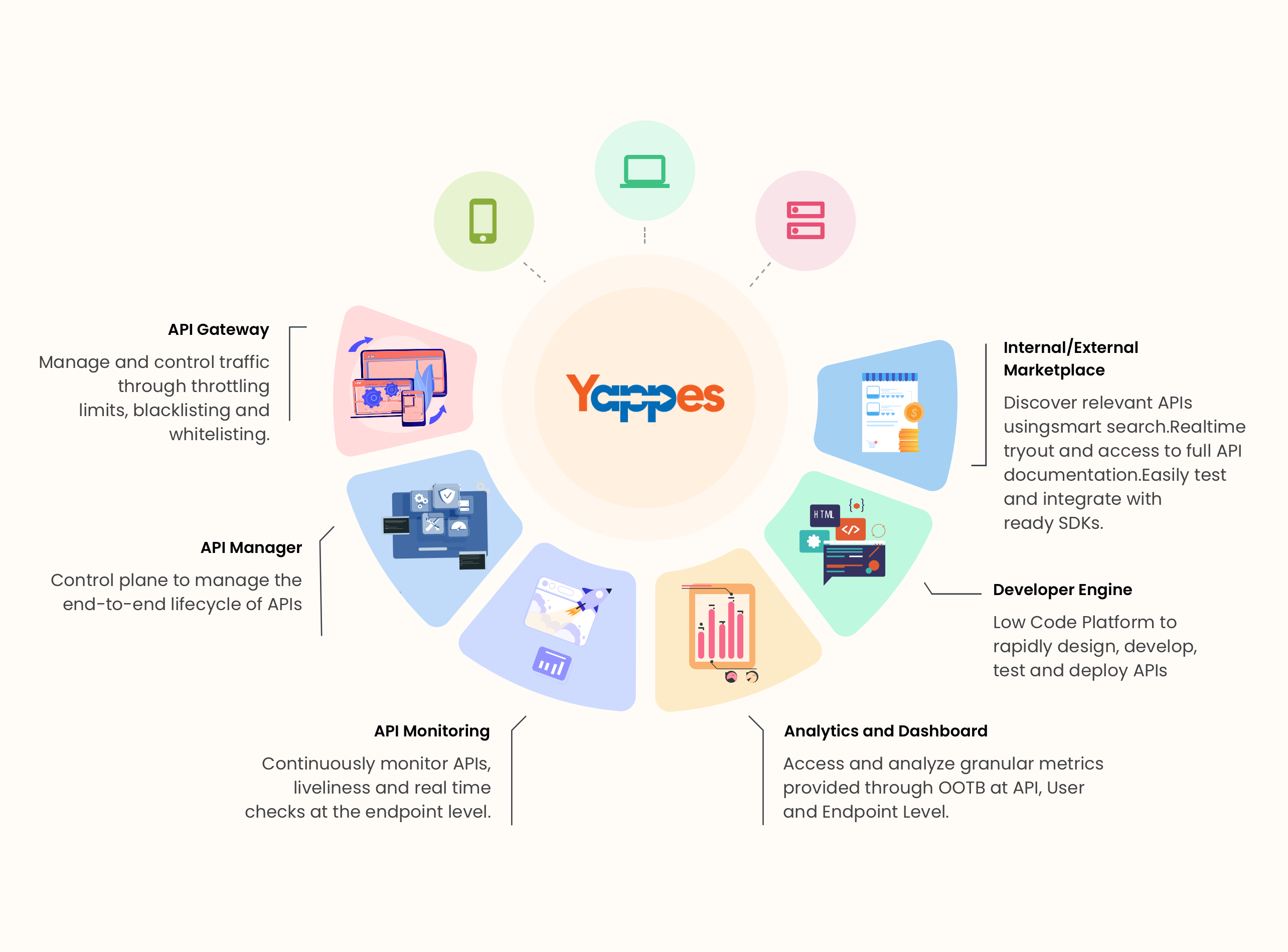API Manager Overview¶
Yappes API Manager enables organizations to securely publish APIs to internal, partner, and external developers at scale. With API Management, you can deploy and manage modern API gateways for existing back-end services hosted anywhere.
It provides a centralized platform to streamline the deployment of APIs, including versioning, security, rate limiting, analytics, & more.
For example, a popular ride-sharing company might use API Manager to provide access to their APIs for third-party developers. By securely publishing their APIs through API Manager, they allow developers to integrate their services into other applications, such as travel planning apps or restaurant reservation platforms.
Deploy APIs¶
On API Manager, deploying APIs involves onboarding your APIs, attaching policies, creating subscriptions, etc., to make them available for API consumers.
- Onboard APIs: The process of integrating your APIs onto Yappes API Manager.
- API Groups: API groups are collections of related APIs. They help in organizing APIs and managing permissions. For example, a healthcare provider might group all patient-related APIs together under a "Patient Management" group.
- Shared Resources: These can be common elements that are shared across multiple APIs. This could include things like authentication tokens, SSL certificates, etc.
- App Authentication: App authentication is the process of verifying the identity of an application attempting to access an API. It enables consumer or client applications to manage authentication, handle tryout keys, track usage, and perform other tasks related to the APIs they consume.
Config Gateway¶
- Gateway Policies: Gateway policies define rules and configurations that manage request traffic, enforce access control, and protect against potential threats or abuse. By utilizing gateway policies effectively, organizations can safeguard their backend services and ensure the proper handling of API requests.
For example, a bank might have a gateway policy that limits the number of API calls within a certain timeframe, such as seconds, minutes, or hours.
API Marketplace¶
Yappes Marketplace is where organizations' APIs are listed for use. Internal, partner, and external developers can discover, test, and purchase APIs. It provides a central location for finding and managing APIs.
- Discover APIs: An organization can publish its APIs and list them on the Marketplace for internal & external users to consume. There are subscription-based plans that users can select to consume APIs.
- My Subscriptions: These are the APIs users have subscribed to.**
- Manage Subscription: You can view and manage subscription details, reset your public/private keys, and perform other actions.
Monetize APIs¶
Monetizing APIs involves creating subscriptions for certain APIs. You can create these subscriptions based on the number of API calls per day or month and charge accordingly.
- Create Subscriptions: Creating subscriptions involves setting up plans for how users or applications can access an API. This could involve setting pricing tiers, usage limits, etc. For instance, a music streaming service might create subscriptions for different levels of access (e.g., basic, premium).
- Manage Subscriptions: Managing subscriptions involves approving and controlling how users or applications are using an API. This includes enforcing usage limits, handling billing, managing access rights, and customizing plans at the API or Group level. It also involves managing subscription keys for internal or external organizations to ensure proper access and usage management.
Monitor & Analytics¶
Monitoring and analytics in API management involves tracking API Endpoints and creating policies for those APIs. This can help identify issues, optimize performance, and understand user behavior.
-
Monitor APIs: You can add APIs to monitor and track each API's endpoints.
-
Policies: You can apply policies such as rate limiting and IP blocking as well as monitor Policies attached to APIs.
